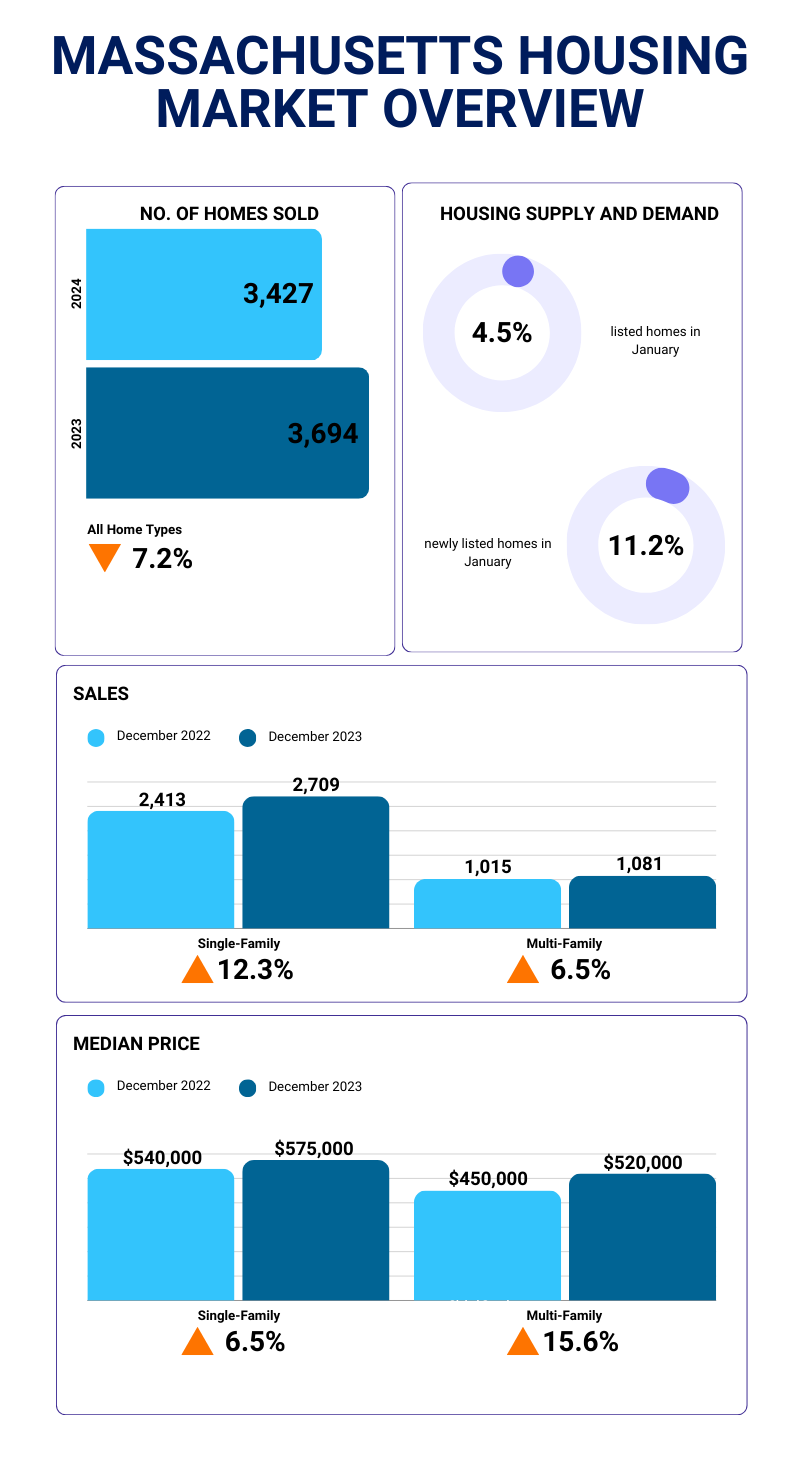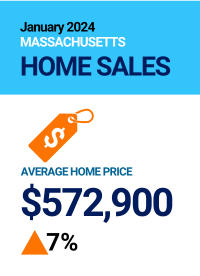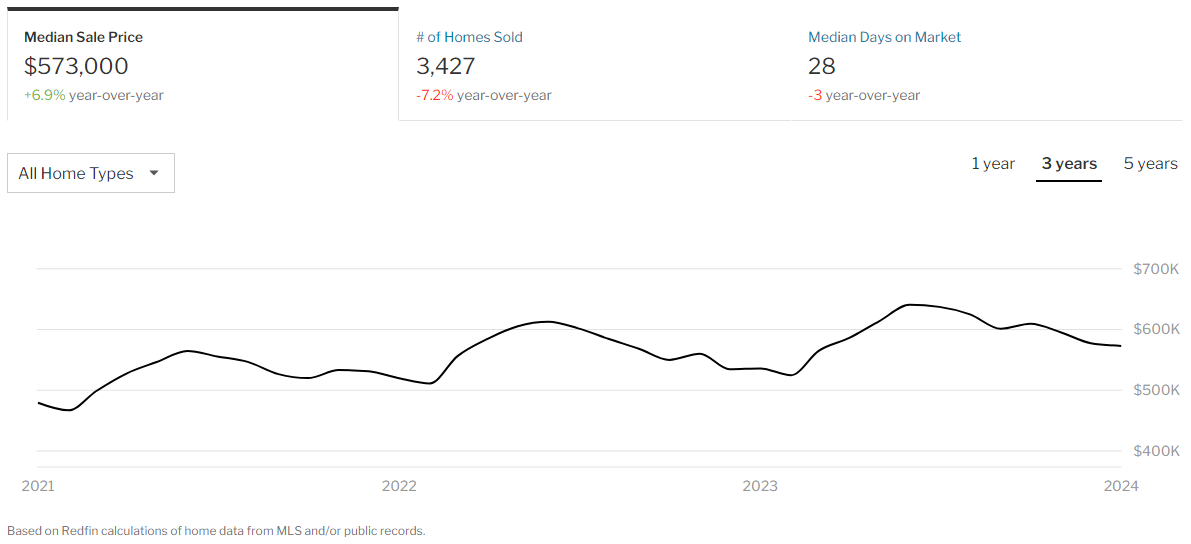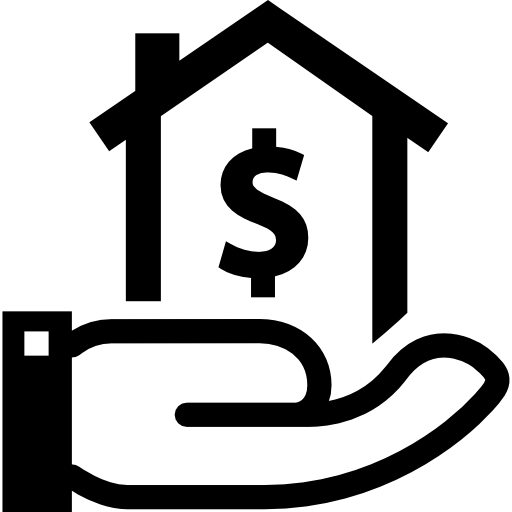Key Summary
- Home prices in Massachusetts were up 7% year-over-year in January, marking a median price of $572,900.
- The sale-to-list price ratio stood above 106% for nearly 71% of homes, indicating a competitive market.
- In January, 42.1% of homes sold above list price, up 7.1 points year over year.
- The number of homes sold fell by 7.9%, and the number of homes for sale decreased by 4.5%.
- The median days on the market were 28 days, down from the previous year, showcasing a fast-moving market despite lower inventory.
Market Overview

It is expected that the housing market in Massachusetts will continue going from strength to strength in 2025. From bustling areas such as Boston to growing cities such as Worcester and Springfield, there generally remains a healthy appetite for property in the state’s real estate sector. However, it is currently being held back due to a lack of availability.
What’s the Average House Cost in Massachusetts?

As of January 2025, the average home price in Massachusetts reached $572,900. This is a 7% increase year-over-year and demonstrates the robust market conditions at present.
Is the Housing Market Slowing Down in Massachusetts?

Credit – https://www.redfin.com/
The Massachusetts housing market remains competitive, although there are challenges such as high-interest mortgage rates and low inventory.
Reports have suggested that Worcester and Springfield are among the top housing markets across the entire nation. Four MA towns also made a recent list detailing places where homes sell the fastest across America.
Sales in January 2025 were down 7.9% YoY with 3402 homes sold throughout the month, so it is clear to see that the market is slowing but we are unlikely to see a housing market crash in Massachusetts. The lack of sales is a result of the low inventory as opposed to low demand.
Massachusetts Housing Supply and Demand
It is easy to be confused by the numbers coming in from the housing market in Massachusetts right now; they present a pretty mixed picture. Ultimately, there are currently both challenges and opportunities within the market.
A Mixed Picture
There was a noticeable decrease in the number of homes for sale in January. 10,559 homes were listed which is a decrease of 4.5% YoY, however, the number of newly listed homes was up 11.2% YoY and US migration trends show that Boston, MA is in the top 10 areas in the country where homeowners are looking to move properties.
This influx of new properties, combined with a keen interest in moving from current homeowners could help to mitigate the pressure of high demand against low supply, which could also help to stabilize the rising house prices being experienced across most of MA right now.
Low Supply
Although we saw an influx of new properties being listed in January, there is a housing shortage in Massachusetts right now. High-interest rates are dissuading homeowners from moving, causing supply issues, which then, in turn, drives prices up.
Supply constraints are further highlighted by the current average months of supply which sits at 2 months. This remains the same YoY, which offers some reassurance as it isn’t declining, but the average months of supply should be between 5 and 6 months.
ℹ️ Did you know? 42.1% of homes in Massachusetts sold above the list price, up 7.1 points YoY.
Signs of Growth
Promising growth has been seen, however, in the number of newly listed homes this month and in the previous quarter, which should drive supply growth. Another key factor that should encourage people to list their homes is the decrease in mortgage rates that is expected in 2025.
The below table shows the dynamics of the Massachusetts housing market in more depth. The data is taken from pending home sales from December 2022 vs December 2023:
| Category | Dec 2022 | Dec 2023 | Change |
|---|---|---|---|
| Single-Family Sales | 2,413 | 2,709 | +12.3% |
| Median Price for Single-Family Homes | $540,000 | $575,000 | +6.5% |
| Multi-Family Home Sales | 1,015 | 1,081 | +6.5% |
| Median Price for Multi-Family Homes | $450,000 | $520,000 | +15.6% |
The information in this table confirms several critical trends within the Massachusetts housing market:
1. Single-Family Home Market Growth
The rise in single-family home sales by 12.3% year-over-year is a testament to the sustained demand for this type of property. The corresponding increase in the median price by 6.5% to $575,000 reflects the Massachusetts real estate market’s responsiveness to demand pressures, with homeowners likely benefiting from appreciating property values.
2. Multi-Family Market Dynamics
The multi-family home sector has also seen growth, with sales up by 6.5%. Notably, the median price for condominiums has experienced a significant hike of 15.6%, climbing to $520,000. The substantial price increase suggests buyers are interested in lower-maintenance living spaces or more urban environments.
3. Market Resilience and Buyer Sentiment
The data from both sectors demonstrates a robust housing market capable of sustaining growth in both sales volume and property values, despite broader economic uncertainties or inventory challenges. The willingness of buyers to engage in the market, even at elevated price points, suggests a strong belief in the long-term value of real estate market investments in Massachusetts.
4. Implications for Future Supply and Demand
The increase in new listings is a pivotal development, suggesting that more homeowners are willing to sell, possibly in response to favorable market conditions. This trend, if sustained, could lead to a more balanced market, alleviating some of the upward pressure on prices while still providing ample opportunities for sellers to capitalize on their investments.
New Builds
Although new listings have increased, and an anticipated interest rate drop should spark more people to sell, demand is still likely to outstrip demand. For decades now, MA has invested too little in building new houses.
There was also restrictive zoning, especially in suburban towns, that prevented multi-family accommodations being built. There has been a shift in this stance, however, with new home construction taking place across the state. The largest development underway is the Del Web Chauncy Lake where 700 condominiums are being constructed, with completion billed for 2025.
What Areas of Massachusetts are in High Demand?
Massachusetts presents a varied real estate landscape, where each region showcases distinct attractions and challenges but four noticeable areas stand out for their growth and appeal in the housing sector. Springfield, Worcester, Boston, and Barnstable Town are all places that stand at the forefront of the Massachusetts property market thanks to their steady sector growth and strategic benefits that draw in buyers and investors alike.
Springfield
Dubbed the “City of Firsts” for its pioneering spirit, Springfield has undergone a significant transformation in its housing market. Its affordability, when juxtaposed with other towns and cities in Massachusetts, alongside considerable investments in infrastructure and development, positions it as a prime spot for residential and commercial interests.
Its strategic location offers seamless connectivity to major Northeastern cities, bolstered by a growing economy in healthcare, education, and manufacturing sectors, thus underpinning a robust demand for housing.
Worcester
As the state’s second-largest city, Worcester has blossomed from its industrial roots into a flourishing hub of culture, education, and innovation. The real estate sector here benefits from the city’s educational institutions, a thriving healthcare industry, and a rejuvenated downtown that appeals to young professionals and families.
With a mix of historic properties and modern living spaces, Worcester’s commitment to cultural and recreational facilities, coupled with economic initiatives, renders it a sought-after location for a balanced urban-suburban lifestyle.
Boston
Boston stands as a beacon of historical significance and modern dynamism, making it a perennial favorite in the Massachusetts real estate market. The city’s rich academic and cultural landscape, combined with its status as an economic powerhouse, drives a constant demand for housing.
Boston’s diverse neighborhoods offer everything from luxury apartments to classic brownstones, catering to a range of lifestyles and budgets. The city’s vibrant community life, along with its extensive parks and waterfronts, keeps Boston at the top of the list for potential homeowners and investors alike.
Barnstable Town
Barnstable Town, with its picturesque Cape Cod setting, offers a unique blend of historical charm and seaside tranquility. This area attracts a variety of buyers looking for vacation homes, retirement properties, or year-round residences. The town’s appeal is enhanced by its maritime activities, local arts scene, and conservation efforts, providing a serene yet engaging living environment.
Despite its more leisurely pace, Barnstable Town remains a competitive market, appealing to those seeking a retreat without straying too far from the economic opportunities and cultural experiences Massachusetts has to offer.
Massachusetts Housing Market Predictions for 2025
The Massachusetts housing market is on the cusp of a subtle shift as we move through 2025, according to industry forecasts and economic indicators. A blend of stabilizing home prices, evolving rental market dynamics, and regional growth variations paint a complex but cautiously optimistic picture of the state’s real estate landscape.
Stabilization in Home Prices
Experts are predicting a slight stabilization in home prices with a decrease of around 0.2% anticipated. Although only a minor decrease, this is a welcome development for potential buyers who may have been sidelined by escalating prices.
It indicates a move towards a more balanced market, where growth in home values aligns more closely with wage increases and inflation rates. This small increase may vary significantly by location within the state, with some areas still seeing increases due to persistent high demand and continued low inventory.
Growth in the Rental Market
As the purchase market begins to stabilize, the rental sector is poised for expansion. This trend is particularly evident in the market for single-family homes, where demand continues to outpace supply.
The shift towards renting can be attributed to several factors, including the affordability challenges that make buying less accessible for many, especially first-time homebuyers and those affected by recent economic uncertainties.
Regional Market Growth and Variances
The prediction for 2025 also highlights the diverse trajectories within Massachusetts’ real estate market.
Cities like Boston, Worcester, and Springfield are expected to experience continued growth, driven by their economic vitality, cultural attractions, and ongoing development projects. These cities have managed to attract a mix of professionals, students, and families, contributing to a dynamic housing market that supports both buying and renting.
On the other hand, some regions of Massachusetts may face challenges, with potential decreases in property values. These areas might be those that have seen less economic development or are adjusting to shifts in population dynamics, such as remote work trends reducing the need to live close to city centers.
Implications for Stakeholders
For sellers, the forecast suggests that pricing strategies may need to be adjusted to align with a more balanced market, while still capitalizing on the high demand in growth areas. Buyers, on the other hand, might find more opportunities to enter the market, especially if the stabilization of home prices is accompanied by improved lending conditions.
Investors and developers will likely focus on the rental market and areas of projected growth, recognizing the long-term potential of investments in these segments.
What to Consider as a Seller in Massachusetts
Sellers in the Massachusetts housing market currently find themselves in a favorable position, thanks to a series of market dynamics that tilt the balance in their favor:
Decreased Listings and Sales
The reduced number of listings and completed sales amplifies the value of available properties, potentially speeding up sales processes.
Increased Competition Among Buyers
The lower inventory levels lead to heightened competition among prospective buyers, often resulting in better sale conditions and prices for sellers.
Strategic Pricing
Setting the right price can attract a wider pool of buyers, possibly sparking bidding wars in high-demand areas.
Market Timing
Evaluate the best time to list your property, considering seasonal trends and economic indicators to maximize interest and value.
Sellers are advised to capitalize on these dynamics by preparing their properties to stand out in the market, pricing strategically, and timing their sales to align with peak buyer interest periods. It is also important to choose a real estate agent with a proven track record.
Alternatively, for a quick cash sale, consider using an iBuyer company. Businesses, such as Moss Home Solutions, can complete sales in a quicker time frame (usually 7 days) and offer cash for your home.
What to Consider as a Buyer in Massachusetts
Buyers face a more challenging landscape, characterized by limited inventory and escalating prices. Housing market predictions are not suggesting signs of a slowdown that would make it a buyer’s market, which is further supported by the average property being on the market for 28 days, down 3 YoY. However, opportunities still exist for those who navigate the market with strategic foresight:
Financial Readiness
Ensuring you have a solid financial foundation, including pre-approval for mortgages, can make you a more attractive buyer in competitive situations.
Investment Goals
Align your property search with your long-term investment objectives, whether looking for a starter home, an upgrade, or an investment property.
Market Research
Understanding local market trends, including which areas are experiencing growth and which are seeing prices stabilize, can guide better buying decisions.
Patience and Flexibility
Be prepared to act quickly on new listings or adjust your expectations based on market realities, balancing your wish list with what’s available and affordable.
Frequently Asked Questions
Where are housing prices falling the fastest in Massachusetts?
While most areas of MA are seeing growth, some towns have fallen. Jeffrey Chubb, an MA real estate agent says that in 2023, we saw falling house prices in towns such as Southampton, Carlisle, Dennis, and Lincoln. That is expected to continue in 2025.
How does the Massachusetts housing market compare to other states in terms of affordability?
The Massachusetts housing market is often perceived as less affordable compared to many other states, particularly due to its high median home prices and the cost of living in major urban areas such as Boston.
Affordability varies significantly across the state, with more affordable options available in smaller towns and rural areas. Factors such as proximity to employment centers, local amenities, and transportation infrastructure also play crucial roles in determining the overall affordability of housing within the state.
Market Momentum
The Massachusetts housing market in 2025 is characterized by resilience and growth. With median home prices continuing to rise and the market maintaining its competitive edge, both buyers and sellers must navigate carefully. The overall picture is one of a dynamic, evolving market, with areas like Worcester and Springfield leading the way in demand.
As we look towards the future, the Massachusetts housing market remains a key area of interest for investors, homeowners, and potential buyers alike, embodying both the challenges and opportunities of real estate in the modern age.
Looking for a quick sale of your MA property? Use our hassle-free process today.





